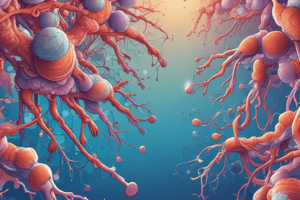Podcast
Questions and Answers
Why is it necessary to fuse a B-plasma cell with a cancer cell to produce monoclonal antibodies?
Why is it necessary to fuse a B-plasma cell with a cancer cell to produce monoclonal antibodies?
- Cancer cells enhance the specificity of the antibodies produced by B-plasma cells.
- B-plasma cells lack the machinery to secrete antibodies, which is provided by cancer cells.
- Cancer cells provide the necessary genetic material for antibody production.
- B-plasma cells are short-lived and do not divide, while cancer cells provide the ability to proliferate. (correct)
What is a hybridoma?
What is a hybridoma?
- A short-lived B-lymphocyte that secretes antibodies.
- A fused cell created from a B-plasma cell and a cancer cell, capable of dividing and producing antibodies. (correct)
- A genetically engineered antibody with enhanced specificity.
- A type of cancer cell used in antibody production.
What characteristic of cancer cells makes them useful in the production of monoclonal antibodies?
What characteristic of cancer cells makes them useful in the production of monoclonal antibodies?
- Their ability to produce diverse types of antibodies.
- Their natural ability to secrete large quantities of proteins.
- Their rapid and uncontrolled proliferation rate. (correct)
- Their inability to be affected by antigens.
Why are monoclonal antibodies considered a significant advancement in immunology?
Why are monoclonal antibodies considered a significant advancement in immunology?
Which of the following explains why cloned B-plasma cells are NOT able to secrete antibodies?
Which of the following explains why cloned B-plasma cells are NOT able to secrete antibodies?
In the context of monoclonal antibody production, what is the role of injecting mice with a specific antigen?
In the context of monoclonal antibody production, what is the role of injecting mice with a specific antigen?
Which of the following best describes the use of monoclonal antibodies in cancer treatment, as exemplified by MabThera?
Which of the following best describes the use of monoclonal antibodies in cancer treatment, as exemplified by MabThera?
What would be the most likely consequence of using non-monoclonal antibodies for a pregnancy test?
What would be the most likely consequence of using non-monoclonal antibodies for a pregnancy test?
How do monoclonal antibodies contribute to tissue typing?
How do monoclonal antibodies contribute to tissue typing?
A researcher is trying to produce a monoclonal antibody against a newly discovered viral protein. Which of the following steps is most critical for the success of this process?
A researcher is trying to produce a monoclonal antibody against a newly discovered viral protein. Which of the following steps is most critical for the success of this process?
What is the primary reason monoclonal antibodies are produced in fermenters?
What is the primary reason monoclonal antibodies are produced in fermenters?
Which of the following is a characteristic of monoclonal antibodies that distinguishes them from polyclonal antibodies?
Which of the following is a characteristic of monoclonal antibodies that distinguishes them from polyclonal antibodies?
How might monoclonal antibodies be used in tumor detection?
How might monoclonal antibodies be used in tumor detection?
A researcher discovers a new protein that is only expressed by cancerous cells. Which of the following strategies would be most effective for developing a targeted cancer therapy using this discovery?
A researcher discovers a new protein that is only expressed by cancerous cells. Which of the following strategies would be most effective for developing a targeted cancer therapy using this discovery?
Why is it important to carefully select the antigen used to stimulate B-plasma cells in monoclonal antibody production?
Why is it important to carefully select the antigen used to stimulate B-plasma cells in monoclonal antibody production?
A lab technician notices inconsistent antibody production from a hybridoma cell line. What is the most likely explanation for this?
A lab technician notices inconsistent antibody production from a hybridoma cell line. What is the most likely explanation for this?
A researcher aims to improve the efficacy of a monoclonal antibody used in cancer therapy. Which of the following strategies would be the most effective?
A researcher aims to improve the efficacy of a monoclonal antibody used in cancer therapy. Which of the following strategies would be the most effective?
Which of the following is a potential limitation associated with the use of murine (mouse-derived) monoclonal antibodies in human therapy?
Which of the following is a potential limitation associated with the use of murine (mouse-derived) monoclonal antibodies in human therapy?
A research team is developing a new diagnostic test for a specific bacterial infection using monoclonal antibodies. What is the MOST important factor to consider when selecting the target antigen on the bacteria?
A research team is developing a new diagnostic test for a specific bacterial infection using monoclonal antibodies. What is the MOST important factor to consider when selecting the target antigen on the bacteria?
Flashcards
Monoclonal Antibody
Monoclonal Antibody
An antibody produced by cloning a unique B-lymphocyte to provide large amounts of one antibody type for treatment and research.
Hybridoma
Hybridoma
A cell formed by fusing a B-plasma cell with a cancer cell, enabling it to divide and produce antibodies.
Why are cancer cells used?
Why are cancer cells used?
Cancer cells' ability to divide and proliferate, making them useful in creating hybridomas.
MabThera
MabThera
Signup and view all the flashcards
How are B-plasma cells initially produced?
How are B-plasma cells initially produced?
Signup and view all the flashcards
Uses of Monoclonal Antibodies
Uses of Monoclonal Antibodies
Signup and view all the flashcards
Study Notes
- Monoclonal antibodies are a key topic in immunology, particularly for combating the COVID-19 virus.
- A monoclonal antibody is produced by cloning a unique B-lymphocyte.
- The goal is to generate substantial quantities of a specific antibody type for treatment and research.
- B-plasma cells that are cloned do not secrete antibodies.
- Antibody-secreting B-plasma cells do not divide.
- Fusing a B-plasma cell with a cancer cell results in a B-plasma cell capable of dividing.
- The fused cell is termed a hybridoma.
- Hybridomas proliferate in fermenters, yielding significant amounts of monoclonal antibodies.
- Mice were used to stimulate the production of initial B-plasma cells by injecting them with the corresponding antigen.
- Monoclonal antibodies feature in the cancer treatment drug MabThera, deployed to treat non-Hodgkin lymphoma and eradicate mutated cancer cells.
- They also have uses for pregnancy tests, AIDS diagnosis, tissue typing, and tumor detection.
Studying That Suits You
Use AI to generate personalized quizzes and flashcards to suit your learning preferences.




